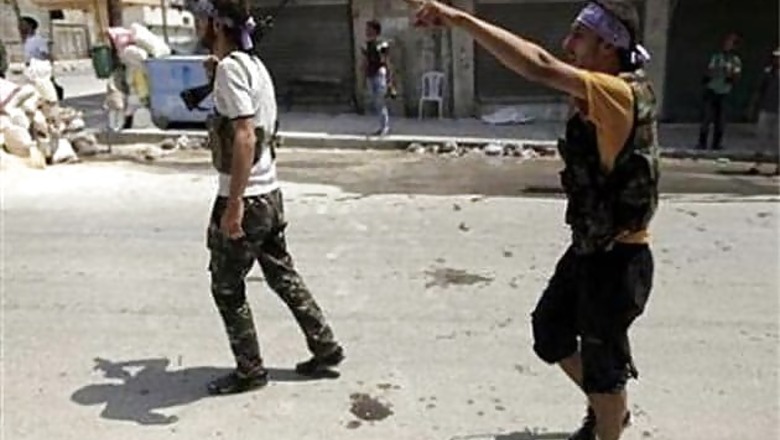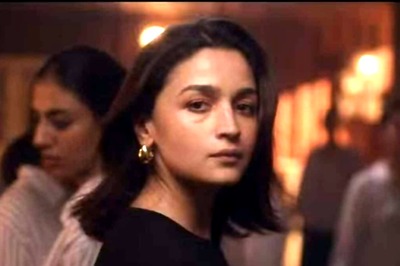
views
Aleppo: President Bashar al-Assad told his troops on Wednesday that their battle against rebels would decide Syria's fate, but his written message gave no clues to his whereabouts two weeks after a bomb attack on his inner circle.
In Aleppo, rebel fighters seized three police stations while fighting the army for control of a strategically important district. Explosions could be heard and helicopter gunships cruised the skies as troops tried to push the rebels out of the northern city and preserve one of Assad's main centres of power.
Assad has not spoken in public since the bombing in Damascus on July 18 killed four of his close security aides, although he has appeared in recorded clips on television. His latest remarks appeared in the military's magazine to mark armed forces day.
"The fate of our people and our nation, past, present and future, depends on this battle," said Assad, whose low public profile suggests acute concern about his safety since the bombing in which his brother-in-law died.
In confronting "terrorist criminal gangs" - the government's usual term for the rebels - the army had proved it had "the steely resolve and conscience and that you are the trustees of the people's values", the 46-year-old president declared.
Earlier, at least 10 volleys of shells lit up the sky over Aleppo, Syria's biggest city, and drowned out the Islamic call to prayer. Carloads of rebels shouting "God is great" sped off towards the fighting. Helicopters could be seen firing over the city.
The World Food Programme said it was sending emergency food supplies to Aleppo to tackle a worsening humanitarian situation.
Syria's civil war has intensified since the July 18 bombing, with fighting engulfing Damascus and Aleppo for the first time in the 17-month-old uprising against Assad family rule.
The two cities are crucial prizes for both sides in an increasingly brutal struggle that has eluded all attempts at a diplomatic solution and risks igniting a wider conflagration.
Internet video footage and witness accounts indicate that rebels have carried out summary executions in and around Aleppo in much the same way as Assad's forces have been accused of acting in Damascus, where the army has largely regained control.
One video shows four men identified as members of the pro-Assad Shabbiha militia being led down a flight of stairs, lined up against a wall and shot in a hail of rifle fire as onlookers shouted "Allahu akbar (God is greatest)".
Russia's Deputy Foreign Minister Gennady Gatilov said the killings, which he called a massacre, "confirms human rights violations are taking place on both sides".
In another video, a cameraman filmed the bodies of about 15 men at a police station. One rebel fired at the corpse of the station commander, blowing his head off. In both cases, the content of the footage could not immediately be verified.
In the town of Azaz, north of Aleppo, a rebel told how his men had executed a captured sniper, shooting him dead after an impromptu "trial" conducted at an already prepared graveside.
"We took him right to his grave and, after hearing the witnesses' statements, we shot him dead," the fighter said.
STREET FIGHTING MEN
Sporadic fighting sputtered on in the bitterly contested Salaheddine district in the southwest of Aleppo, part of a rebel-held arc stretching to the northeast of the city.
Neither side was in full control, despite an army statement at the weekend that it had driven insurgents from the district, now a ghost town with closed shops and empty streets.
On Al-Sharqeya Street, residents and shop owners looked in awe at the damage. Some rifled through what was left of their buildings. Huge piles of concrete, and twisted reinforced metal intertwined in the dust.
"I saw death before my eyes," said Abu Ahmed who was leaving his home. "I was hiding in the alleyway of my building when I heard the whizz of the artillery. Look at my street now."
They said the damage was caused by helicopter fire targeting a rebel brigade based in a school. It missed the school and hit the residential buildings instead.
"This dog Assad and his men are so blind they can't even target a brigade properly," said Abu Ahmed, waving a plastic bag with his belongings inside.
Syrian state television said on Wednesday the army was pursuing remaining "terrorists" in one Aleppo district and had killed several, including foreign Arab fighters.
Some foreign fighters, including militant Islamists, have joined the battle against Assad, who often accuses outside powers of financing and arming the insurgents.
An NBC News report said the rebels have acquired nearly two dozen surface-to-air missiles delivered via neighbouring Turkey. The missiles could erode the military's air supremacy if rebels are able to hit its helicopters and warplanes.
The rebels are also continuing to strike effectively against Assad's ground forces. In the Yarmouk refugee camp in southern Damascus, residents said rebel fighters managed to seize two tanks from the army during fierce afternoon clashes.
Assad's forces have retaken most Damascus districts from the rebels, but fighting has continued intermittently in the south and residents report army shelling from Qassioun mountains overlooking the centre of the city.
FOOD, FUEL SHORT
Aleppo, a commercial hub with a historic Old City, had long stayed aloof from the uprising, but many of its 2.5 million residents are now caught up in battle zones, facing shortages of food, fuel, water and cooking gas. Thousands have fled.
"The humanitarian situation is deteriorating in Aleppo and food needs are growing rapidly," the World Food Programme said.
The UN agency said it had sent food aid for 28,000 people to the city, where hospitals and makeshift clinics can barely cope with casualties after more than a week of combat.
Lightly armed insurgents are battling a well-equipped army that has overwhelming superiority on paper, but rebels have nonetheless managed to capture some tanks and heavy weapons, the
United Nations observer mission in Syria has confirmed.
The rebels, however, are united mostly by loathing of Assad, and have failed to come together despite pressure from the West, Turkey and Sunni-ruled Arab states who back their cause.
Another fissure in the opposition opened up on Tuesday when exiled Syrian activists announced a new alliance with plans to form a transitional government, challenging the Syrian National Council, an opposition umbrella group set up last year.
The head of the rebel Free Syrian Army criticised the new political coalition, calling its leaders opportunists seeking to divide the opposition and benefit from the rebels' gains.
Assad, whose Alawite sect is an offshoot of Shi'ite Islam, is strongly supported by Iran and to a degree by Iraq's Shi'ite-led government. China and Russia have protected him in the UN Security Council from measures that could lead to sanctions.
The UN General Assembly said on Tuesday it would discuss Syria this week and diplomats say it is likely to vote on a Saudi-drafted resolution that condemns the Security Council for failing to take action against Damascus.
US Defense Secretary Leon Panetta, visiting Jerusalem, said he hoped Assad would step down and "we can begin the transition to a democratic process there for the Syrian people".



















Comments
0 comment